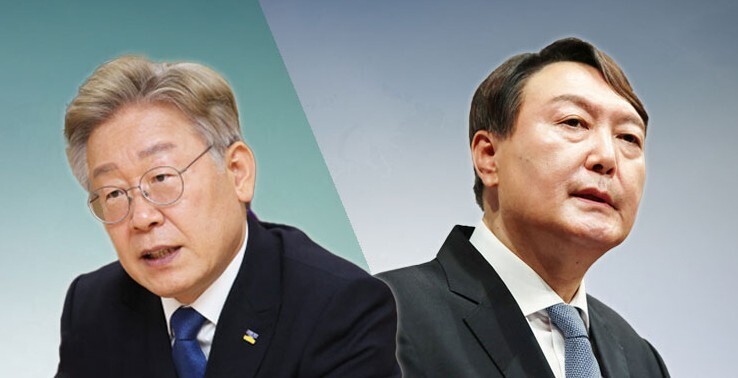hankyoreh
Links to other country sites 다른 나라 사이트 링크
[Column] Rule of law or rule of lawyers?

The first attorneys in modern Korean history emerged during the late stages of the Joseon era. The “Encyclopedia of Korean Culture” records that “Hong Jae-gi and two others received their attorney licenses through Legal Decree No. 4 in 1906.”
A century later in 2006, the number of attorneys registered with the Korean Bar Association passed the 10,000 mark. South Korea currently boasts over 35,000 legal professionals, including attorneys, judges and prosecutors.
That’s more than the number of accountants (24,000), but far fewer than the number of physicians (130,000, not counting dentists and doctors of Korean medicine) or pharmacists (80,000).
Yet the prestige that legal professionals enjoy in the eyes of South Koreans is something that goes beyond numbers. Their influence is rapidly expanding beyond the legal world and into the realms of politics and the economy.
Among the current presidential hopefuls, Democratic Party nominee and Gyeonggi Province Gov. Lee Jae-myung is a member of the legal world, as are the two top People Power Party (PPP) contenders, former Prosecutor General Yoon Seok-youl and National Assembly member Hong Joon-pyo. If the current trends keep up, the 20th President of South Korea will be a former legal professional, just like 19th President Moon Jae-in.
Among members of the 21st National Assembly, 46 (15.3%) are legal professionals, far outnumbering those who passed the public administration examination (27), journalists (20), and businesspeople (11).
A total of 816 people were appointed as outside directors at general shareholder meetings for listed companies this April. Attorneys accounted for 95 of them, or 11.6% — a respectable third place behind university professors (228) and businesspeople (153).
The rise of legal professionals holds a positive meaning, in the sense that the employment of legal experts is a reflection of a growing climate of the rule of law.
In his book “People, Power, and Profits,” Joseph Stiglitz, a professor and Nobel laureate in economics, stressed the importance of the rule of law as a key element in the outstanding social organizations that form a central pillar of national wealth. Legal professionals perform a special public function in making the rule of law happen: The ultimate reason for attorneys’ existence lies in the practice of the public interest, with the realization of justice and the rule of law, he writes.
South Koreans have been very upset, then, to find many prominent legal professionals implicated in the recent scandal surrounding development improprieties in Seongnam’s Daejang neighborhood — among them former Supreme Court justices, special prosecutors, prosecutors general, and chief prosecutors.
In another scandal concerning prosecutors’ alleged incitement of legal complaints, many of the key figures involved are legal professionals: prosecutor Son Jun-seong and PPP lawmaker Kim Woong, who are respectively alleged to have sent and received the complaint documents, and Yoon Seok-youl, who is subjected of pulling the strings for Son.
As the key figures in our judicial system, legal professionals command great authority and a profound influence that extends throughout society.
When they lose sight of their public responsibilities even for a moment and slip out of social control — focusing their energies instead on pursuing private regards regardless of the law — that is a serious matter indeed. That in and of itself undermines the rule of law and negates legal professionals’ very reason for being.
Just like the “Republic of Samsung” that places itself above the law, the “Republic of Legal Professionals” Korea sees today must also be a target of reforms.
By Kwack Jung-soo, editorial writer
Please direct questions or comments to [english@hani.co.kr]

Editorial・opinion
![[Column] Season 2 of special prosecutor probe may be coming to Korea soon [Column] Season 2 of special prosecutor probe may be coming to Korea soon](https://flexible.img.hani.co.kr/flexible/normal/500/300/imgdb/original/2024/0426/3317141030699447.jpg) [Column] Season 2 of special prosecutor probe may be coming to Korea soon
[Column] Season 2 of special prosecutor probe may be coming to Korea soon![[Column] Park Geun-hye déjà vu in Yoon Suk-yeol [Column] Park Geun-hye déjà vu in Yoon Suk-yeol](https://flexible.img.hani.co.kr/flexible/normal/500/300/imgdb/original/2024/0424/651713945113788.jpg) [Column] Park Geun-hye déjà vu in Yoon Suk-yeol
[Column] Park Geun-hye déjà vu in Yoon Suk-yeol- [Editorial] New weight of N. Korea’s nuclear threats makes dialogue all the more urgent
- [Guest essay] The real reason Korea’s new right wants to dub Rhee a founding father
- [Column] ‘Choson’: Is it time we start referring to N. Korea in its own terms?
- [Editorial] Japan’s rewriting of history with Korea has gone too far
- [Column] The president’s questionable capacity for dialogue
- [Column] Are chaebol firms just pizza pies for families to divvy up as they please?
- [Column] Has Korea, too, crossed the Rubicon on China?
- [Correspondent’s column] In Japan’s alliance with US, echoes of its past alliances with UK
Most viewed articles
- 1‘We must say no’: Seoul defense chief on Korean, USFK involvement in hypothetical Taiwan crisis
- 2Why Kim Jong-un is scrapping the term ‘Day of the Sun’ and toning down fanfare for predecessors
- 3Two factors that’ll decide if Korea’s economy keeps on its upward trend
- 4Gangnam murderer says he killed “because women have always ignored me”
- 5South Korea officially an aged society just 17 years after becoming aging society
- 6BTS says it wants to continue to “speak out against anti-Asian hate”
- 7After election rout, Yoon’s left with 3 choices for dealing with the opposition
- 8No good, very bad game for Korea puts it out of Olympics for first time since 1988
- 9Ethnic Koreans in Japan's Utoro village wait for Seoul's help
- 10US citizens send letter demanding punishment of LKP members who deny Gwangju Massacre